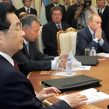
SHANGHAI COOPERATION ORGANIZATION SUMMIT SUGGESTS NEW RUSSIA-CHINA LINKS
Publication: Eurasia Daily Monitor Volume: 2 Issue: 130
By:

As the six Shanghai Cooperation Organization (SCO) members gathered Kazakhstan’s capital, Astana, on July 5, the summit meeting seemingly adopted a measure of anti-Western rhetoric. The SCO states (China, Russia, Kazakhstan, Kyrgyzstan, Uzbekistan, and Tajikistan) not only suggested that the U.S.-led coalition forces in Afghanistan should announce a timetable for withdrawal, they also issued a declaration demanding, among other things, a limit to outside interference in a country’s internal affairs.
The SCO leaders signed a joint declaration and a “Concept of SCO Cooperation against Terrorism, Separatism, and Extremism.” The Tashkent summit last year decided to strengthen the SCO, and the organization moves towards multilateral cooperation between member states and growing interaction with other international organizations, said the declaration.
The SCO declaration, as well as a bilateral Russo-Chinese declaration on “World Order in the 21st Century” adopted on July 2, did not mention the United States directly. However, these documents are understood to target perceived U.S. domination in international affairs. Both declarations reiterated the principles of mutual respect of sovereignty and territorial integrity, mutual non-aggression and non-interference.
Moreover, the SCO urged the U.S.-led coalition forces in Afghanistan to declare a timetable for withdrawal from Afghanistan as well as from the Uzbek and Kyrgyz bases in the region that were set up to support operations in Afghanistan. According to the declaration, now that the active military phase of the Afghanistan campaign is over, the coalition should set a deadline for withdrawing their troops from SCO states (RIA-Novosti, July 5).
However, the SCO states would not allow a security vacuum to emerge following the anticipated coalition withdrawal from the region. The SCO leaders would rather fill the vacuum themselves: they pledged to boost security cooperation. Chinese President Hu Jintao said after the summit meeting in Astana: “We have to make every effort to step up security cooperation or else all our talks about stability will be pointless.”
Beijing has been repeatedly emphasizing a security angle, noting that the SCO plays an important role in safeguarding regional security and promoting member states’ common development. Hu Jintao outlined this view in a written interview with the Kazakhstan News Agency, on the eve of the SCO summit (Xinhuanet, July 2).
For some SCO leaders, security cooperation could be vital. For instance, Uzbekistan’s President Islam Karimov faced bloody riots in Andijan in May and has been cornered by Western criticism since then. Not surprisingly, when facing a possible regime change, Karimov came to value Russian and Chinese backing on the Andijan crackdown. He told a press conference in Astana on July 5 that the international community should feel the presence of the SCO on the international arena soon.
Russian media and analysts appear to agree that the SCO has been leaning towards anti-Western thinking, and possibly a course of action. The SCO countries proved vulnerable to “color revolutions,” hence the SCO now re-thinks its concept of operation, Kommersant commented. Now the SCO aims to counter “color revolutions” through collective action (Kommersant, July 5).
In the wake of “color revolutions” in the former Soviet Union and the U.S. invasions of Afghanistan and Iraq, the SCO seeks to curb U.S. influence in Central Asia, said Vyacheslav Nikonov, president of the Politika Foundation, a Moscow-based think tank. The SCO states are “coming to share an interest in restricting American influence in Asia,” he said (RIA-Novosti, June 29).
However, Russian officials have tended to deny obvious conclusions, claiming that the SCO does not intent to sustain repressive post-Soviet regimes. The SCO is not an “anti-orange” block, Russian Foreign Minister Sergei Lavrov claimed in June 2005.
In the meantime, the SCO officials approved observer status for Iran, Pakistan, and India. The leaders believe the decision to grant observer status to India, Iran and Pakistan “will expand the capacity of the organization to develop multilateral and mutually beneficial cooperation,” according to the declaration.
Iranian First Vice President Mohammad Reza Aref said that Iran could become a bridge between the SCO and Persian Gulf states. Pakistani Prime Minister Shaukat Aziz thanked the SCO for granting Pakistan observer status and said the region was full of possibilities to ensure stability and progress. Indian Foreign Minister Natwar Singh also thanked the SCO for granting his country observer status and said India would cooperate with the organization (RIA-Novosti, July 5).
The Russian media commented that the SCO enlargement was a potentially divisive issue, particularly between the two largest members: Russia and China. Russia sought to bring India into the SCO, while China suggested Pakistan for the SCO enlargement. Subsequently, both India and Pakistan were accepted as observers (Izvestiya, July 6).
Although touted as an exercise of the “multi-polar world” concept and “multilateralism,” the SCO’s decision to admit Iran inevitably becomes an affront to the West. It remains to be seen whether the SCO could limit its perceived drift towards anti-Westernism.




